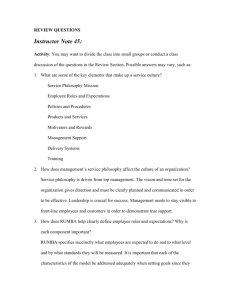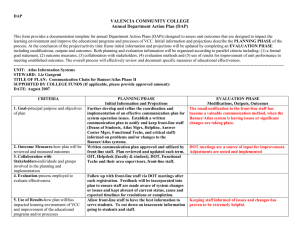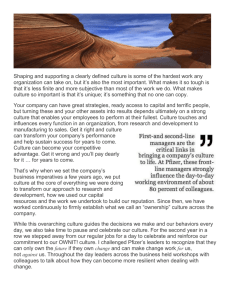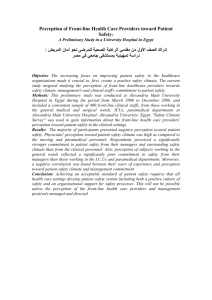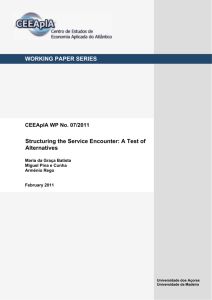highlights for social workers
advertisement
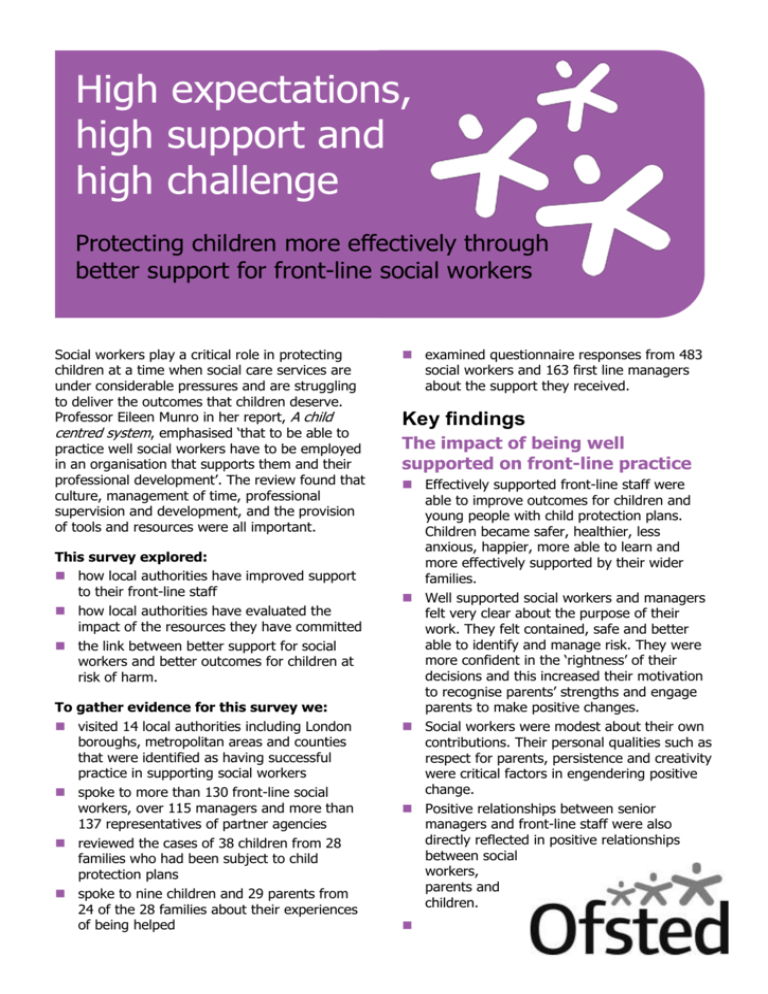
High expectations, high support and high challenge Protecting children more effectively through better support for front-line social workers Social workers play a critical role in protecting children at a time when social care services are under considerable pressures and are struggling to deliver the outcomes that children deserve. Professor Eileen Munro in her report, A child centred system, emphasised ‘that to be able to practice well social workers have to be employed in an organisation that supports them and their professional development’. The review found that culture, management of time, professional supervision and development, and the provision of tools and resources were all important. This survey explored: how local authorities have improved support to their front-line staff how local authorities have evaluated the impact of the resources they have committed the link between better support for social workers and better outcomes for children at risk of harm. To gather evidence for this survey we: visited 14 local authorities including London boroughs, metropolitan areas and counties that were identified as having successful practice in supporting social workers spoke to more than 130 front-line social workers, over 115 managers and more than 137 representatives of partner agencies reviewed the cases of 38 children from 28 families who had been subject to child protection plans spoke to nine children and 29 parents from 24 of the 28 families about their experiences of being helped examined questionnaire responses from 483 social workers and 163 first line managers about the support they received. Key findings The impact of being well supported on front-line practice Effectively supported front-line staff were able to improve outcomes for children and young people with child protection plans. Children became safer, healthier, less anxious, happier, more able to learn and more effectively supported by their wider families. Well supported social workers and managers felt very clear about the purpose of their work. They felt contained, safe and better able to identify and manage risk. They were more confident in the ‘rightness’ of their decisions and this increased their motivation to recognise parents’ strengths and engage parents to make positive changes. Social workers were modest about their own contributions. Their personal qualities such as respect for parents, persistence and creativity were critical factors in engendering positive change. Positive relationships between senior managers and front-line staff were also directly reflected in positive relationships between social workers, parents and children. Parents were included well in planning and decision-making. They recognised the importance of social workers’ commitment to honest relationship building which enabled them to decide to trust social workers and fully engage in child protection plans. Almost all children and parents were positive about the benefits of the child protection plans and described how these had improved their lives. What well supported front-line staff can expect from their organisation A culture of high expectations, high support and high challenge. A ‘no blame’ approach and mutual ownership and responsibility in managing risks will be strongly emphasised. In this empowering context staff will receive scrutiny and knowledgeable challenge which will in turn empower them to exercise their professional judgement. Well planned, rigorous and forward looking recruitment with high levels of support and challenge at all stages of career pathways which staff surveyed said was important as financial reward in deciding to remain with an authority. Clearly defined standards and expectations, as well as systematic performance audits and evaluation of the quality of practice and supervision. Support from line managers who really understand the work and become directly involved with parents. Line managers provide regular, very frequent and high-quality formal and informal supervision to help manage the emotional impact of the work and to critically reflect on practice. Particular support at critical points in the life of a child protection plan: at the point the plan commences; in deciding to end a plan; or in challenging parental non-engagement. A high level of mutual support and understanding from team colleagues which contributes significantly to being motivated and enjoying work. Families benefit because teams work cooperatively to manage crises and provide continuity in a social worker’s absence. Well timed and relevant learning and development opportunities. Support from partner agencies that share responsibility for identifying and managing risks, are actively engaged in change-focused work and are willing to challenge and resolve differences of professional opinion. Senior managers who work with staff to find creative, local solutions to challenges, who identify additional resources often at no extra cost, release time to work with children and families and keep caseloads manageable. Senior managers who make it a priority to respond to increasing demand and create manageable caseloads and use a flexible ‘one authority’ approach to share pressures and referrals across teams. Skilled team managers also make sure that work is fairly allocated. How local authorities knew that their support was effective Local authorities measured the effectiveness of support to staff through feedback and from ongoing monitoring and auditing. However, formal evaluation of the impact of support was complex and rarely undertaken. The extent to which written plans and reviews clearly identified desired outcomes and the changes that occurred was variable. Local authorities did not track and aggregate the impact of child protection plans. Few case records did justice to the quality and impact of critical analysis that inspectors identified as taking place, or evidenced the impact of the support provided on outcomes for children. High expectations, high support and high challenge: Protecting children more effectively through better support for front-line social worker includes further details and case studies of effective practice. February 2011 The report and a summary report is available on Ofsted’s website: www.ofsted.gov.uk/resources/110120
